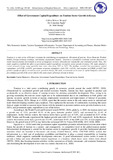Please use this identifier to cite or link to this item:
http://ir-library.mmust.ac.ke:8080/xmlui/handle/123456789/2306Full metadata record
| DC Field | Value | Language |
|---|---|---|
| dc.contributor.author | Wanjala, Collins Wekesa | - |
| dc.contributor.author | Ngala, Consolata | - |
| dc.contributor.author | Maingi, Muli | - |
| dc.date.accessioned | 2023-10-05T06:34:13Z | - |
| dc.date.available | 2023-10-05T06:34:13Z | - |
| dc.date.issued | 2023-08-09 | - |
| dc.identifier.uri | https://doi.org/10.51867/ajernet.4.2.16 | - |
| dc.identifier.uri | https://ajernet.net/ojs/index.php/ajernet/article/view/91 | - |
| dc.identifier.uri | http://ir-library.mmust.ac.ke:8080/xmlui/handle/123456789/2306 | - |
| dc.description.abstract | Tourism is a vital sector of Kenya’s economy by contributing to employment, alleviation of poverty, Gross Domestic Product (GDP), foreign exchange earnings, and balance of payments surplus. Tourism is a productive economic activity that needs a stable macroeconomic environment in terms of budgetary resource allocation for sustainable and continued growth. Thus, this study sought to establish the effect of government capital expenditure on tourism sector growth in Kenya. The study adopted a causal research design using quarterly time series data from 2012 to 2021. The findings revealed that government capital expenditure (t=3.4746, p<0.05), government recurrent expenditure (t=6.1303, p<0.05), and taxation (t=2.8608, p<0.05) had positive significant effects on tourism sector growth in Kenya. The study recommends an increase in capital budgetary allocation for continued growth of the sector which is the main source of foreign revenue in Kenya. | en_US |
| dc.language.iso | en | en_US |
| dc.publisher | AFRICAN JOURNAL OF EMPIRICAL RESEARCH | en_US |
| dc.subject | Effect,Government, Capital, Expenditure, Tourism, Sector, Growth | en_US |
| dc.title | Effect of Government Capital Expenditure on Tourism Sector Growth in Kenya | en_US |
| dc.type | Article | en_US |
| Appears in Collections: | Gold Collection | |
Files in This Item:
| File | Description | Size | Format | |
|---|---|---|---|---|
| Effect+of+Government+Capital+Expenditure+on+Tourism+Sector+Growth+in+Kenya+-+Wanjala,+Ngala+&+Mainga.pdf | 607.78 kB | Adobe PDF |  View/Open |
Items in DSpace are protected by copyright, with all rights reserved, unless otherwise indicated.
